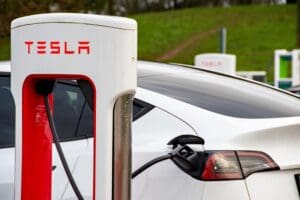Electric vehicle owners will be required to pay a new 3p-per-mile tax from 2028, Chancellor Rachel Reeves confirmed today in the Autumn Budget — marking the UK’s first dedicated mileage charge for zero-emission cars.
The measure is designed to offset the sharp decline in fuel duty revenue, which has fallen year-on-year as more motorists switch from petrol and diesel to electric alternatives. The Treasury argues that long-term changes are needed to protect public finances as the transport sector transitions to clean energy.
Shane Pither, EV expert at Select Car Leasing, said the announcement represents a significant shift in government policy — and will force many drivers to reassess their running costs.
“Today’s announcement signals a notable shift in the sustainable transport market as the government begins moving revenue focus away from petrol and diesel vehicles,” he said. “Confirmation from the Chancellor will understandably prompt concerns among current EV drivers and those considering making the switch.”
Pither added that, while the move has long been expected, the new charge could feel steep for motorists who had not budgeted for an additional per-mile cost. High-mileage drivers, in particular, may need to rethink financial assumptions about total cost of ownership.
He warned that the tax presents another hurdle for EV manufacturers already struggling to persuade hesitant consumers to adopt electric vehicles, especially amid concerns about upfront costs, charging access and declining resale values.
However, Pither emphasised that the fundamentals remain strong.
“Even with this future tax in place, EVs will remain cost-effective and sustainable transport choices,” he said. “Drivers still benefit from low servicing costs and increasingly competitive electricity tariffs. The long-term financial and environmental advantages of going electric have not changed.”
He added that as EV adoption accelerates, policy frameworks are likely to evolve: “Manufacturers will need to be clever with their messaging, clearly communicating the wider value of EVs. This announcement should not discourage potential buyers.”
The new tax is expected to raise billions in lost revenue over the coming decade and forms part of a broader restructuring of UK road taxation as the automotive sector transitions away from fossil fuels.
Read more:
EV drivers to face new pay-per-mile tax from 2028, Reeves confirms in Budget
